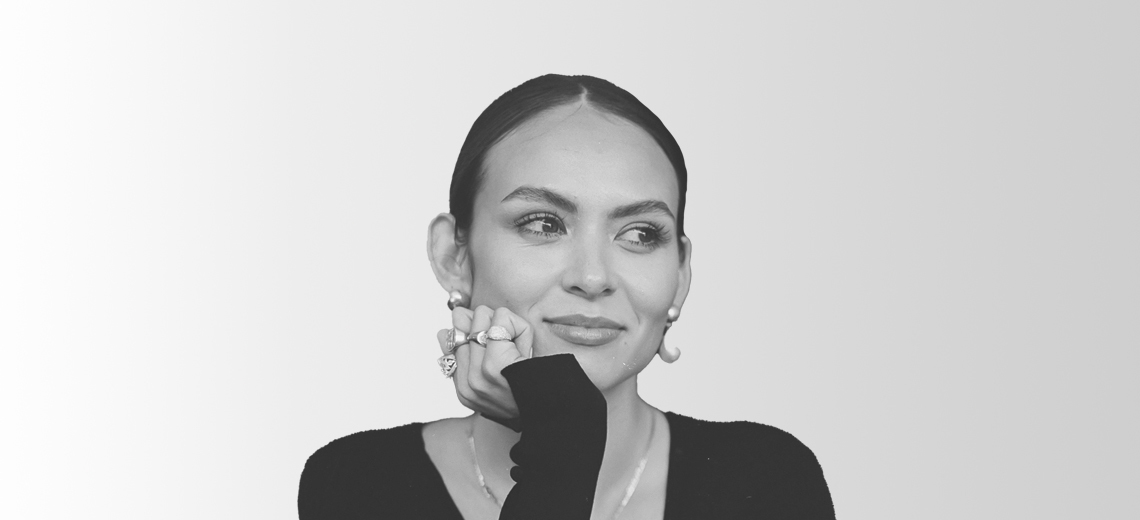This is an episode of the Glossy Fashion Podcast, which features candid conversations about how today’s trends are shaping the future of the fashion industry. More from the series →
Subscribe: Apple Podcasts • Spotify
Emily Oberg, founder and owner of the 5-year-old wellness-based brand Sporty & Rich, wants to change the definition of success.
“Never not working isn’t cool. … You don’t need to have a crazy work schedule, where you feel like you can’t keep up, [in order] to be successful,” Oberg said on the latest episode of the Glossy Podcast. “At one point, that was the definition of success, but it’s changing. And I want to be part of that change.”
After starting her career in streetwear, working as a video personality at Complex before heading up womenswear at Kith, Oberg saw the opportunity to build an owned brand based on the success of her mood-board-style Instagram account, Sporty & Rich. She co-founded the brand as it stands in 2018. It has since earned fans including Hailey Bieber, collaborated with brands like Adidas, opened an experiential store in NYC’s SoHo neighborhood and reached $30 million in annual revenue. Along with building Sporty & Rich to a $200 million brand, Oberg has big plans for its future.
“It’s my vision to make a Sporty & Rich country club, where you have everything: colonics, your naturopath, you can do your blood work, you can do your tennis lessons, you can go to the pool, you can see your trainer, you can do a Pilates class,” she said. “It would take a lot of resources and a lot of investment, but I hope to have these in every major city. That’s [a place] where I’d want to spend my time.”
Below are more of the conversation’s highlights, which have been lightly edited for clarity.
Transitioning from media to retail
“When you work in fashion media, you know so much about all of the brands. And you really get to case-study new brands, old brands, established brands, heritage brands, … And there’s just such a depth and wealth of knowledge that you accumulate when you’re covering these things and when you’re doing stories on the individuals themselves; you’re able to have a look inside all of these different people and all of these different brands at the same time, and it’s very rare. … I didn’t think that I could just, like, go in and do it. I was super nervous when I first started [at Kith], because I was like, ‘I don’t know how to do this. I don’t know what I’m doing. I’m gonna learn, I’m gonna figure it out.’ But, I [also] think there was a side of [me saying], ‘I’ve covered brands, and I know how it works.’ [I knew] the ins and outs of building a brand, what makes a brand succeed, what makes a brand last, and why some brands work and other brands don’t. And just knowing what’s relevant and being on top of that definitely helped me in my role.”
The role of a startup founder
“We’re still such a small brand; we’re a team of [around] 30, but we should really be a team of 60. So everyone’s doing everything, not just me. We’re all wearing a million different hats. I am definitely like the creative director of the brand, and everything regarding visuals, identity, marketing and communications strategy is me. I also design everything myself. So, I’m doing a lot. … I’m also helping on the wholesale strategy. And when we opened the retail shop, I was there training the café staff, I made the menu, I chose all the ingredients, I was dealing with the suppliers for the café, calling the alarm company, dealing with the architect, … [I was] in there every day just, like, vacuuming the carpet. You just have to do everything — and I love it, though. If you’re in this business, you’re in it because you love it. I’m just so fulfilled by it that I don’t mind if I’m in the bathroom cleaning toilets or mopping the floor, because I’m building my dream.”
Building a lasting brand
“From the start, I really wanted the image to be a focus — just because I feel like that’s such an important part of building a brand, [along with] the storytelling. There are a lot of brands out there where the product is incredible and the quality is top-notch, but the image and the marketing may not be as strong. And that hurts the brand overall — because, at the end of the day, what we’re selling is a lifestyle and an image. And [Sporty & Rich is selling] an image that people want to be part of. And it’s less so about the product, though I’m not saying that we’re not also focused on making good-quality product. … People want to feel like they can see themselves living the lifestyle that we’ve created and that we show through our images. I’m really passionate about creating strong images; it’s what I love to do. There’s no better feeling than having an idea in your head, putting a team together, [managing] production, being on set, seeing it happen, and then seeing the end result and just being like, ‘Wow, this is exactly what I had in mind.’ The brands with a really strong image are the ones that stand the test of time.”




